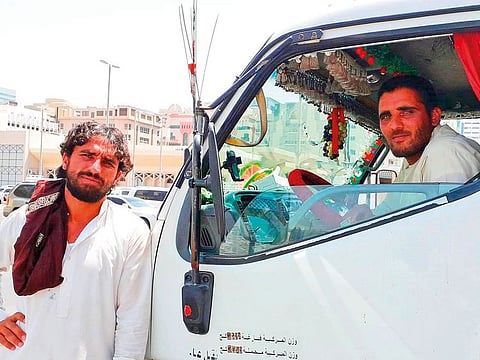Meet porters, pickup drivers who fast in sweltering heat
They don’t complain even though they work outdoors, without air-conditioning

Abu Dhabi: Most residents spend their fasting hours in cool, air-conditioned workplaces, but many pickup drivers and porters in downtown Abu Dhabi observe their daily fast in the scorching heat.
The drivers remain inside their pickup trucks, parked under the hot sun, with open windows to call out to customers. One can also see the porters sheltering beside mosques walls and other buildings before making a dash for customers when they see an approaching car.
They work hard outdoors without complaining about the weather — temperatures these days are hovering at highs of over 40C.
The drivers and porters are mostly in the furniture transport business used by residents to move furniture.
Pakistani expat Bobrai Palay Gul, 28, said: “We don’t feel any kind of trouble fasting in summer. We don’t fast as per the weather conditions, we fast whenever the holy month of Ramadan comes, whether it’s sweltering summer or freezing winter. It’s an obligation of Islam and we feel blessed to observe it.”
“Ramadan comes only once a year and we feel fortunate to fast; we never skip it,” added Gul, who lives on Shaikh Rashid Bin Saeed Street (Airport Road).
Most of them park their trucks beside the Central Post Office on Sultan Bin Zayed The First Street (Muroor Road).
“Business is slow during Ramadan. We hardly get any customer, but still we come here each morning at 10am and remain until 5.30pm. We remain seated without air-conditioning. It’s the blessing of Ramadan that we don’t feel exhausted and we pray at the nearby mosque.”
Suhour
Some drivers cook suhour at home, while others prefer to visit restaurants. Gul said: “For suhour, we have to wake up early to prepare our meals. Sometimes we go to restaurants and cafeterias. It depends on how much time is left for suhour.”
They generally prepare vegetable curry and rice, which they say is the easiest and quickest thing to cook, and sometimes also have it with Afghan bread from traditional bakeries. But for iftar, they always visit iftar tents or the Shaikh Zayed Grand Mosque to end their fast.
“This [iftar] is a great service by the government for all residents, low-income people and labourers. We have free access to any tent. But if it gets full, we rush to the Grand Mosque where we get treated for iftar for sure.”
Porters’ fast
Porters, who load and unload furniture from the pickup trucks also observe fast the whole of Ramadan, remaining outdoors the entire day.
Rahmatullah, a 26-year-old porter, said: “It’s very difficult to prepare meals so early for suhour, so I eat at the cafeterias instead. I have some paratha [Indian pan-fried bread] or Afghan bread with vegetable or meat curries.”
He added: “For iftar, I go to any one of the iftar tents inside the Madinat Zayed area. They serve good meals, and the quantity is more than enough for one person. Just half an hour before ending the fast, we rush to iftar tents.”



